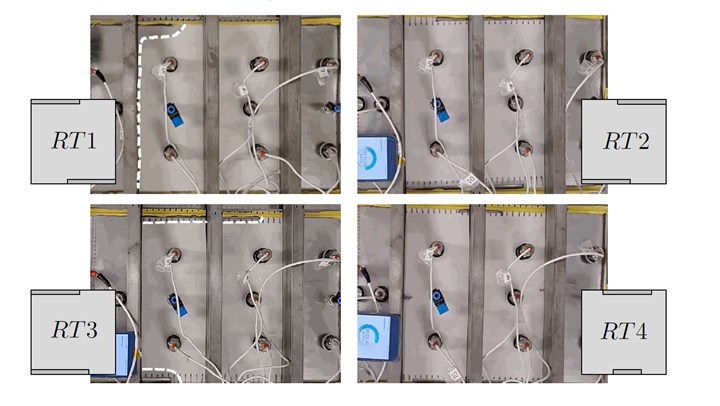IMDEA introduces digital twin for real-time analysis of composite materials production
Newly designed digital twin by IMDEA and Technical University of Madrid researchers enables manufacturers to see inside composite materials as they are being produced, facilitating early detection of faults.
An experimental data set (25 × 2 injection tests) with induced resin transfer with fluid transfer recorded by sensors. Source | IMDEA Materials Institute
Researchers from IMDEA Materials Institute (Madrid, Spain) and the Technical University of Madrid (UPM) have developed a digital twin that enables real-time analysis of composite materials manufacturing. The breakthrough was recently presented in The International Journal of Advanced Manufacturing Technology in the article “A Digital Twin for intelligent manufacturing of structural composites via liquid molding.”
The publication is the work of IMDEA Materials researchers professor Carlos González and Drs. Joaquín Fernández-León and Keayvan Keramati, along with UPM’s professor Luis Baumela. In it, the authors present a digital twin for analyzing the manufacturing process of structural composite materials using resin transfer molding (RTM).
“As far as I understand, this is the first digital twin designed to analyze the manufacturing process of a composite material,” says co-author González, head of the structural composites research group at IMDEA Materials.
A digital twin is a virtual model or representation of an object, component or system that can be updated through real-time data via sensors, either within the object itself or incorporated into the manufacturing process. According to researchers, what distinguishes the newly designed digital twin from similar applications is its focus on the composite material manufacturing process itself, rather than being limited to post-production analysis of manufactured parts. This proactive capability is said to enable real-time optimizations and early fault detection, marking an evolution in the field of simulation-assisted digital manufacturing.
“In this publication, what we have demonstrated is a digital twin that can provide the manufacturer with a real-time picture of the material throughout the entire manufacturing process,” explains González. “This allows monitoring of how the mold is filling, the level of porosity within the material, if there are holes present, etc.”
RTM represents an advanced technique within liquid composite molding (LCM), characterized by its ability to produce high-performance composite material parts with reduced void content cost-effectively. By integrating RTM with digital twin technologies, real-time monitoring and dynamic adjustments of critical process parameters, such as injection pressure and curing time, are facilitated, improving final product quality and production efficiency.
“The next step involves the development of an advanced digital twin that enables operators to not only monitor the production process in detail, but also to intervene directly in it, applying real-time adjustments based on predictive modeling,” adds Fernández-León. “This could include, for example, automatically modifying resin injection pressure or mold temperature to prevent defect formation, based on the predictive analysis of the digital twin, paving the way for highly optimized intelligent manufacturing.”
Related Content
-
Price, performance, protection: EV battery enclosures, Part 1
Composite technologies are growing in use as suppliers continue efforts to meet more demanding requirements for EV battery enclosures.
-
PEEK vs. PEKK vs. PAEK and continuous compression molding
Suppliers of thermoplastics and carbon fiber chime in regarding PEEK vs. PEKK, and now PAEK, as well as in-situ consolidation — the supply chain for thermoplastic tape composites continues to evolve.
-
Composite rebar for future infrastructure
GFRP eliminates risk of corrosion and increases durability fourfold for reinforced concrete that meets future demands as traffic, urbanization and extreme weather increase.














.jpg;maxWidth=300;quality=90)


